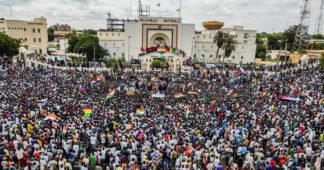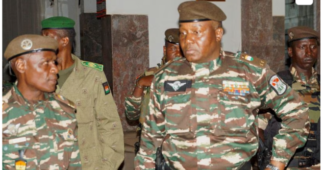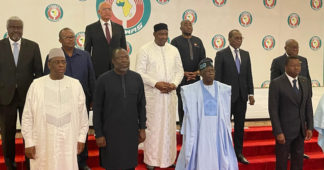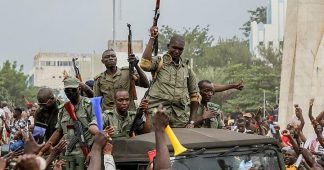Ghanaian journalist Esther Yiadom reflects on the different social, economic, and geopolitical motivations behind the coup in Niger
by Esther Yiadom
August 10, 2023
Following the military takeover of power in Niger from the Bazoum-led administration on July 26, concerns have been raised about the supply of uranium as the EU and especially France depend largely on uranium from the country to fuel their nuclear reactors and for medical purposes. Data from Euratom indicates that Niger was the EU’s second largest supplier of uranium in 2022, when it alone supplied the EU with 2,975 tU (representing 25.4%). The landlocked country was followed by Canada which supplied 2,578 tU (22.0%), and Russia which supplied 1,980 tU (16.9%) that same year. Kazakhstan was the highest supplier with 3,145 tU (representing 26.8%). Other countries together contributed 5.2%.
The seizure of power by the junta has so far attracted sanctions and threats of war from regional and international blocs, although not unexpected.
First, the ECOWAS regional bloc, currently being led by Nigerian President Bola Tinubu, threatened to forcefully deploy soldiers to get rid of the junta and restore constitutional order if Bazoum’s presidency is not restored by August 6. ECOWAS has also imposed severe economic sanctions on Niger and ordered member countries to close land and air borders with the poor country. Niger depends on Nigeria for about 70% of its power supply but the latter has since cut the supply as part of the sanctions. Tinubu has also written seeking his Senate’s approval to deploy soldiers to restore democracy in Niger should the coup-makers be recalcitrant.
The Central Bank of West African States (BCEAO) has terminated a planned 30 billion CFA-Franc (equivalent to USD 51 million) bond issuance by Niger. Benin has also indicated that there may be a delay in the execution of a PetroChina-backed export pipeline project which is expected to link Niger’s Agadem oilfield to the port of Cotonou in Benin. The Benin government however maintained that border closures imposed by ECOWAS members will not affect construction work on the pipeline.
The World Bank has also announced a suspension of disbursements to Niger. The US and France have also decided to do the same and this may endanger landlocked Niger over hundreds of millions of dollars in aid.
In response, leader of the coup, General Abdourahamane Tchiani, has declared that he would not bow to any pressure to reinstate ousted President Bazoum and warned all blocs to refrain from the country’s internal affairs. He went on to criticize the sanctions as illegal and inhumane and called on his compatriots to get ready to defend their nation. Meanwhile, Burkina Faso and Mali, who are also Niger’s neighbors and currently under military junta rule, have cautioned ECOWAS that any military intervention in Niger is tantamount to war in all the three countries.
France, Italy, and Germany have begun evacuating their citizens from Niger. The US has also ordered a partial evacuation of its embassy. Senegal and Ghana are currently exploring possibilities of evacuating its citizens.
Currently, Niger has closed its airspace as the coup-makers have defied ECOWAS’ deadline amidst military intervention threats.
Brief background: remote factors
Niger has had a vibrant bourgeois democracy, yet has been saddled with dreadful internal politics. In the last elections, for instance, 30 presidential candidates contested, which led to Mohamed Bazoum being elected. The ruling PNDS-Tarayya (Bazoum’s party) was accused of unilaterally handpicking and selecting members of the Independent National Commission (CENI), the body in charge of organizing elections in Niger. Concerns were raised by the opposition but all fell on the deaf ears of the PNDS government.
The MODENFA/FA opposition party therefore boycotted the elections and so the situation heightened the internal political violence in the country. The Constitutional Court at that time barred Hama Amadou from running in the 2020 elections. There were a series of protests by civil society activists against the political tensions which were being created by the PNDS administration. Some of the activists were arrested and imprisoned for holding political views.
Additionally, a large portions of Niger has been rendered ungovernable due to a major problem of insurgency and insecurity. There is the presence of four major insurgency groups at work in Niger. The first is the Jihadist group which continues to threaten security in the country by escalating violent attacks especially in the west and south-west regions of Niger. Boko Haram is also very active in Diffa and Bosso regions. Islamic State (IS) continues to create tensions in the southeast. Al-Qaeda and ISIL are active in the west. In the northern part of Niger too, a coalition of al-Qaeda loyalists known as Jama’at Nasr al-Islam wal Muslimin (JNIM) and the IS are reported to have about 2,000 fighters.
In order to be able to deal with this issue of Jihadism and other insurgencies in the country, the Bazoum government preferred to use non-state armed groups to complement the national army. Again, there were intolerable responses to all forms of dissenting public opinion, protests, and criticism of the government, to the extent that sometimes internet users who posted anti-government opinions on social media pages were prosecuted. That is why the soldiers who participated in the coup have stated that one of their reasons was the deteriorating security situation in the country.
Niger is a periphery dependent economy and highly unstable. It has a multi-party republic modeled after France. Executive power is exercised by both the president who serves as the head of state and the prime minister who serves as head of government. Legislative authority is also vested in both the National Assembly and the government. The judiciary exercises authority over constitutional issues. Although the judiciary ought to be independent of both the executive and legislature, it is usually accused of corruption and vulnerability to executive meddling. In short, none of the arms of government, not even the judiciary, is trusted enough by the citizens. They are accused of corruption and of being used by the ruling class to the detriment of trade unionists, political activists, and ordinary citizens.
Moreso, Niger has experienced a terrible economic situation for a long time and it is usually reported as one of the poorest countries in the world, despite its rich resources. This is one of the remote factors leading to the coup. There is a high rate of unemployment as well as illiteracy. In 2018, the rate of literacy in a vast and populated country like Niger was 35%. Even though basic education is supposed to be free and compulsory, most children lack this access because the schools are not available, and also the roads leading to some available schools are not motorable. Some of the consequences of this are low employment opportunities for the youth, high rate of child labor in the mines, and child trafficking. The most dangerous effect is the fact that insurgency groups radicalize and recruit the disgruntled youth for violence.
Apart from the internal remote factors explained above, there is a very important geopolitical factor at play. Niger is endowed with vast reserves of uranium, needed by countries like France, China, and the US for their nuclear weapons. The country is also rich in coal, tin, iron ore, gold, and crude oil deposits. There is therefore no doubt that there are powerful foreign interests at play leading to geopolitical struggle over the country.
Some of the countries have established military bases, not in the interest of the ordinary people of Niger, but rather to secure and protect their own governments’ interests and control over the rich mineral reserves, especially uranium.
France alone has about 1,500 troops across several military bases. The Airlit, Tamou and Tagora uranium ore reserves are mined by Societe des Mines de l’Air (SOMAIR). SOMAIR is partly owned by French multinational company ORANO which controls about 63.4% interest in the reserves.
France continues to explain the reason for deploying troops in Niger as help to combat insecurity in the Sahel region. However, after many years, there is persistence of insecurity, tensions, and violence. This has led to lack of development and deteriorating economic conditions in the country. Failure to curtail the attacks has created a growing anti-French sentiment among people not only in Niger but also in Mali and Burkina who are all neighbors.
Immediate cause
With the remote factors rife for political instability, ousted President Bazoum’s intention to change the leadership of the presidential guard was a major immediate cause of the coup in Niger. In other words, there have been reports that the coup leader was about to be sacked. Bazoum has also frequently been accused of being autocratic and intolerant of dissenting political views.
Esther Yiadom is a journalist based in Ghana and a member of the West African Peoples’ Organization (WAPO).
We remind our readers that publication of articles on our site does not mean that we agree with what is written. Our policy is to publish anything which we consider of interest, so as to assist our readers in forming their opinions. Sometimes we even publish articles with which we totally disagree, since we believe it is important for our readers to be informed on as wide a spectrum of views as possible.











